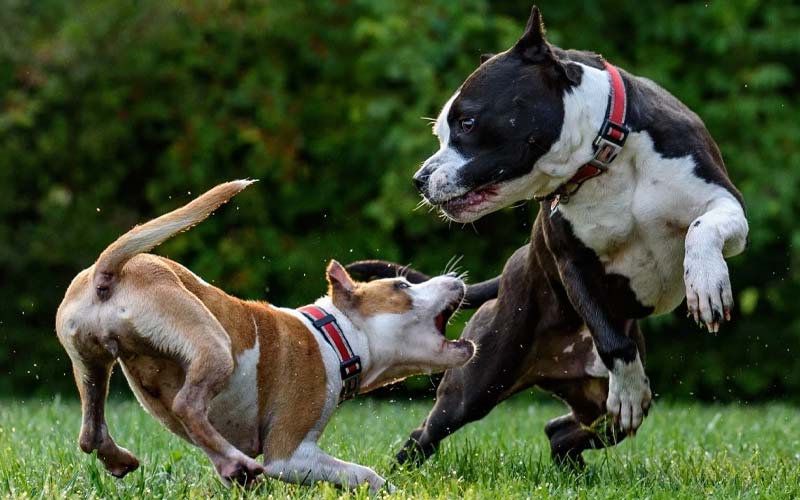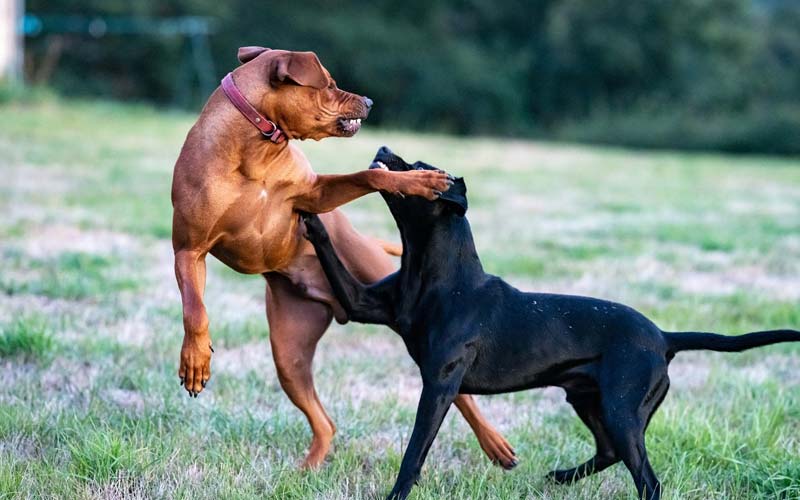If your dog has suddenly become aggressive towards you, there are several possible causes. This article will discuss the most common causes of dog aggression, as well as how to identify and address the problem.

Dog aggression is a serious issue that can affect the relationship between you and your furry friend. It can also pose a risk to your safety and the safety of others. Aggressive behavior can include growling, snapping, barking, or biting. It can be directed towards people, other dogs, or other animals.
Dog aggression can be caused by a variety of factors, including fear, pain, or underlying medical conditions. Some dogs may have a genetic predisposition to aggression, while others may develop it due to lack of socialization, previous negative experiences, or environmental triggers.
The purpose of this article is to discuss the most common causes of dog aggression towards family members. By understanding the reasons behind your dog’s behavior, you can take steps to prevent or reduce aggression and improve your bond with your dog.
Fear-based aggression
This type of aggression is caused by fear or anxiety. Your dog may feel scared of something or someone and react aggressively to protect themselves. Fear-based aggression can be triggered by loud noises, unfamiliar people or animals, new situations, or objects that your dog perceives as threatening.
For example, your dog may growl or snap at you if you try to touch them when they are hiding under the bed during a thunderstorm. Or they may bark or bite at a stranger who approaches them too quickly or invades their personal space.
Defensive aggression
This type of aggression is caused by the dog feeling threatened or cornered. Your dog may feel that they have no other option but to fight back when they are in a vulnerable position. Defensive aggression can be triggered by physical restraint, punishment, or confrontation.
For example, your dog may bite you if you try to pull them off the couch or force them into a crate. Or they may snap at you if you scold them or stare at them in a dominant way.

Status-related aggression
This type of aggression is caused by the dog feeling the need to assert dominance. Your dog may feel that they are the leader of the pack and that they have to control the resources and the rules. Status-related aggression can be triggered by challenges to the dog’s authority, such as ignoring their commands, moving them from their spot, or taking away their toys.
For example, your dog may growl or bite you if you try to sit on their favorite chair or take their bone. Or they may bark or snap at you if you do not obey their cues, such as jumping on you or nudging you with their nose.
Possessive aggression
This type of aggression is caused by the dog guarding something they feel is theirs, such as food, toys, or space. Your dog may feel that they have to protect their valuable items from being taken away or shared with others. Possessive aggression can be triggered by approaching the dog when they are eating, playing, or resting.
For example, your dog may snarl or bite you if you try to take their food bowl or toy. Or they may growl or snap at you if you try to join them on the bed or couch.
Redirected aggression
This type of aggression is caused by the dog being frustrated or aroused and then directing their aggression towards a person or animal that was not the original target. Your dog may feel that they cannot reach or attack the source of their frustration, such as a squirrel, a cat, or another dog. Redirected aggression can be triggered by leash pulling, fence fighting, or window barking.
For example, your dog may bite you if you try to stop them from chasing a squirrel or barking at a neighbor’s dog. Or they may snap at you if you try to calm them down or distract them from the stimulus.
How to identify the cause of your dog’s aggression
Identifying the cause of your dog’s aggression is the first step to addressing the problem. You can do this by observing your dog’s body language, vocalizations, and triggers. Here are some tips to help you identify the cause of your dog’s aggression:
- Look for signs of fear, such as ears back, tail tucked, eyes wide, or body lowered.
- Look for signs of threat, such as ears forward, tail stiff, eyes narrowed, or body tense.
- Look for signs of possession, such as ears flat, tail wagging, eyes focused, or body hovering.
- Listen for the tone and intensity of your dog’s growls, barks, or snarls. A low-pitched, prolonged, or repeated sound may indicate more aggression than a high-pitched, short, or single sound.
- Notice what triggers your dog’s aggression, such as people, animals, objects, or situations. Try to avoid or minimize these triggers as much as possible.

Conclusion
Dog aggression is a complex and challenging issue that can have many causes. By understanding the reasons behind your dog’s behavior, you can take steps to prevent or reduce aggression and improve your bond with your dog.
Some tips for how to address dog aggression are:
- Consult your veterinarian to rule out any medical problems that may cause or worsen aggression.
- Seek professional help from a certified dog trainer or behaviorist who can assess your dog’s aggression and provide a customized treatment plan.
- Use positive reinforcement techniques to reward your dog for calm and friendly behavior and to teach them alternative ways to cope with stress or frustration.
- Avoid using physical punishment, force, or intimidation, as these can increase your dog’s fear and aggression.
- Provide your dog with adequate exercise, mental stimulation, and socialization to keep them healthy and happy.
Dog aggression can be a serious problem, but it can also be managed or resolved with proper care and guidance. If you are struggling with your dog’s aggression, do not hesitate to seek professional help. You and your dog deserve a safe and harmonious relationship.
